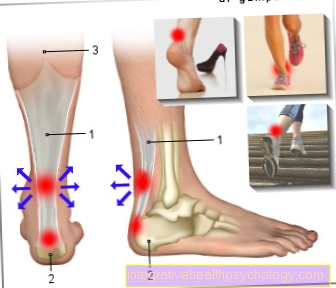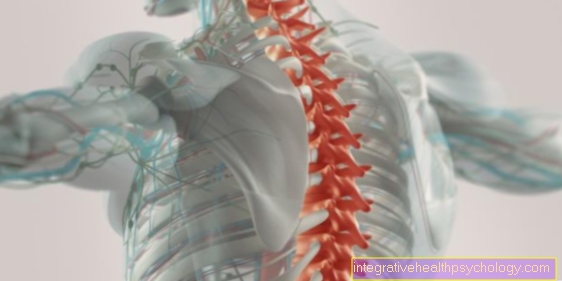Medication for dizziness
Synonyms
Antivertiginosa
introduction
The drugs against dizziness are preparations that help relieve dizziness or reduce the symptoms. Dizziness can have many causes. Because of this, there is also a large number of drugs with different modes of action. The trigger for the dizziness ultimately decides which drug is most suitable for treating the dizziness.
There are these drug groups
There are various active substances or groups of drugs that can be used to treat dizziness. In general, these are referred to as antivertiginous drugs in medical terminology. These include antihistamines, anticholinergics, benzodiazepines and calcium channel blockers.
- The antihistamines are used in particular for so-called travel sickness and also for diseases of the inner ear such as Menieré's disease. Above all, dimenhydrinate and betahistine are two well-known representatives for the treatment of dizziness with vomiting and nausea.
Dimenhydrinate is available from pharmacies under the trade name Vomex® and is often administered to treat dizziness caused by travel. Vomex® can also be used in children, although it should of course be administered in a lower dose than in adults. Possible and frequently described side effects when using histamine antagonists include increased drowsiness and a feeling of drowsiness.
Read more on this topic at:
Antihistamines
Vomex®
Treatment of motion sickness
Treatment of Menieré's disease - With regard to the treatment of vertigo symptoms, scopalmin is the most important representative of the anticholinergics. It is particularly useful for travel and motion sickness, which is typically characterized by dizziness and vomiting.You can find more about this at: Anticholinergics
- The benzodiazepines are a large group of drugs that are used in particular for calming. The greatest number of benzodiazepines has in common that they have an "anti-dizziness" or an anti-vertiginous effect. It should be noted that the administration of benzodiazepines can also have the opposite effect or increase dizziness.
Read more about the drug group at: Benzodiazepines - Flunarizine is one of the calculus canal blockers. It is mainly used for the prophylaxis of vestibular migraines, i.e. migraines with dizziness that originate in the ear or in the organ of equilibrium. It is also used as a drug for sudden attacks of dizziness.
Read more about the treatment of vestibular vertigo at: Migraines and dizziness - what helps against it?
All drugs that can be used against dizziness are aimed at alleviating the symptoms. However, this does not fix the cause of the dizziness. The use of antivertiginous drugs should therefore generally only be temporary.
In addition to medication, diagnostics should also be carried out to find the cause - this means examinations and, if necessary, imaging that should help to uncover the cause of the vertigo.
You might also be interested in: These are the causes of dizziness
For more information on this topic, we recommend our website: Therapy for vertigo
Over-the-counter drugs
Over-the-counter medications include dimenhydrinate, also better known as Vomex®, and herbal preparations such as Vertigoheel® or Taumea®. Even if these drugs can be purchased without a prescription, they should ideally be taken in consultation with a doctor, especially in the case of existing underlying diseases, in order to avoid interactions with other drugs. If necessary, the pharmacist can also be consulted.
You can find more on the subject at:
- Vomex®
- Homeopathy for dizziness
Vomex®
Dimenhydrinate belongs to the large group of antihistamines, which are also used for allergic reactions and nausea. Dimenhydrinat or Vomex® is freely available in pharmacies and is particularly popular for people suffering from motion sickness or seasickness. It has a soothing effect on dizziness as well as nausea and vomiting. Vomex® is available in various forms of administration, including suppositories, coated tablets, syrups and tablets. It usually works for 3-6 hours and can be taken when needed.
Taking it during pregnancy and breastfeeding is not advisable due to insufficient data on the effects on the unborn child. According to the manufacturer, Vomex® can be used in children, with the dosage depending on age and weight. The most common side effects when taking Vomex® include increased tiredness and slight drowsiness.
Further information on dimenhydrinate can be found at: Vomex®
Prescription drugs
The entire group of active substances, the benzodiazepines, is one of the prescription drugs. These harbor the risk of dependency, especially when given for a longer period of time, which is why they are usually prescribed rather cautiously.
Flunarizine, which belongs to the group of calcium antagonists, is also one of the drugs that can only be obtained with a prescription from the pharmacy. Furthermore, certain antihistamine preparations, such as the active ingredient betahistine, can only be purchased upon presentation of a prescription. Other drugs from the group of antihistamines, such as dimenhydrinate (Vomex®), are in turn freely available in pharmacies.
Read more about prescription drugs at:
- Benzodiazepines
- Flunarizine
- Dimenhydrinate
Flunarizine
Flunarizine is one of the drugs that affect the calcium channels. It is used in the treatment of migraines and continues to have a very good effect on vertigo symptoms with a vestibular origin - i.e. vertigo whose cause is in the balance organ of the inner ear.
Because of this, it is more often prescribed for Menieré's disease. It is a disease of the organ of equilibrium, which is characterized by tinnitus, severe sudden dizziness and a hearing loss. Flunarizine is a prescription drug. Especially when you start taking medication you may feel drowsy and drowsy.
Read more at:
- Flunarizine
- Treatment of Menieré's disease
Arlevert®
Arlevert® contains an active ingredient complex of cinnarizine and dimenhydrinate.
It is used for dizziness and is mainly used in the treatment of dizziness in connection with Menieré's disease. This is a disease of the organ of equilibrium, which is associated with severe dizziness, tinnitus and hearing loss. Alevert® is only available from pharmacies after submitting a prescription and is intended for the short-term treatment of dizziness.
Also read: Treatment of Menieré's disease
What drugs help with psychogenic dizziness?
In the case of psychogenic dizziness, which is often referred to as fear dizziness or phobic dizziness, drug therapy is generally not effective. Those affected mostly suffer from fears or phobias that lead to the development of symptoms of dizziness. A large number of those affected also suffer from other mental illnesses such as depression.
The therapeutic approach is therefore less a medication than a psychotherapy. Behavioral therapy, in particular, is preferred for people with psychogenic dizziness. The medication that may be administered as a support is then less of a means that helps against dizziness than preparations that have an anxiolytic or antidepressant effect.
Also read: Dizziness from anxiety and stress
Homeopathy for dizziness
There are numerous preparations from the homeopathic field that are said to have a soothing effect on dizziness of various origins. These include the homeopathic remedies Vertigoheel®, Traumea® or Vertigopas®.
Vertigoheel®, for example, contains the herbal active ingredients gray ambergris, coconut grains and stone oil, which are supposed to reduce the symptoms of vertigo.
As with the other drugs used against dizziness, the cause cannot be eliminated here either. However, there are no clear studies on most drugs or their effectiveness. The use of homeopathic remedies is therefore often a controversial topic, both among doctors and among those affected.
Further information on this topic can be found at: Homeopathy for dizziness
Vertigoheel® against dizziness
Vertigoheel® contains various so-called natural ingredients, including gray ambergris, coke grains, hemlock and stone oil. It is intended to reduce the symptoms of dizziness and, according to the manufacturer, can be used for dizziness of various causes. In addition to dizziness, it is also said to have a positive effect on nausea. Here, too, the preparation cannot fix the cause, but only relieve the symptoms of dizziness. Vertigoheel® is available in both tablet and drop form and can be purchased from pharmacies without a prescription.
More about this topic can be found: Homeopathy for dizziness
Ginkgo for dizziness
Ginkgo is a plant that originated in China. It has been known as a medicinal plant in Germany for many years. There are numerous diseases and complaints in which Ginkgo is said to have a soothing effect. So also with dizziness.
In contrast to other drugs, which often have a sedating or calming side effect, only a low side effect potential is ascribed to ginkgo. It is particularly popular in alternative medicine and there are numerous studies on its effectiveness. Unfortunately, the study situation is not yet clear and the data from the analyzes are partly contradicting. Ginkgo preparations are available in pharmacies, there is a large selection of products from various manufacturers that are supposed to help against dizziness.
Read more about the medicinal plant at: Ginkgo for dizziness
Taumea against dizziness
Traumea® is also one of the natural or plant-based drugs. It includes Anamirta cocculus (yellow jasmine) and Gelsemium sempervirens (dummy myrtle). According to the manufacturer, the dual active ingredient can be used against different types of vertigo.
As with the other herbal and homeopathic medicines, no clear studies on the effectiveness are described here either. It should always be taken in consultation with the attending physician, especially for those affected who still suffer from other underlying diseases.
Further questions
Is it possible to take Antivertiginosa during pregnancy and breastfeeding?
The use of anti-dizziness medication during pregnancy is severely limited. The use of benzodiazepines and flunarizine is not recommended as they can influence the child's development.
In the case of dimenhydrinate, administration in the first 2/3 of pregnancy should be harmless, but should not be taken in the last third. In general, pregnant women should always seek advice from a doctor or gynecologist before taking anti-dizziness preparations. This also applies to the use of herbal or homeopathic preparations.
Further information on this topic can be found at: Dizziness during pregnancy
Does it have any effect on the pill?
The effectiveness of the pill can be influenced by the use of other medications, such as benzodiazepines. In order to ensure adequate contraceptive protection, other contraceptives such as condoms should be used.
No interactions with the pill and its effectiveness are described for the use of flunarizine. However, it is advisable to clarify with your doctor before you start taking it. When taking preparations containing dimenhydrinate, such as Vomex®, no interactions with the pill have been known to date. The effect or effectiveness of the birth control pill should therefore remain unaffected.


.jpg)


























